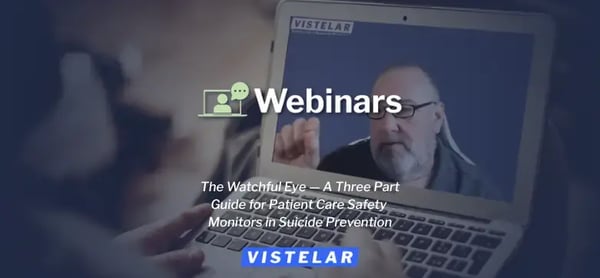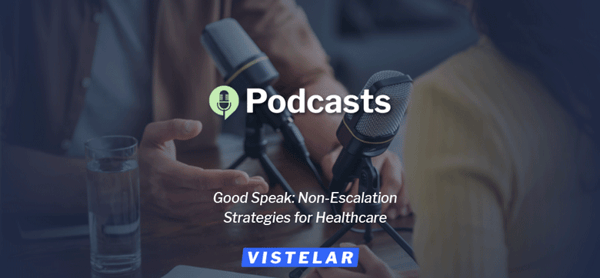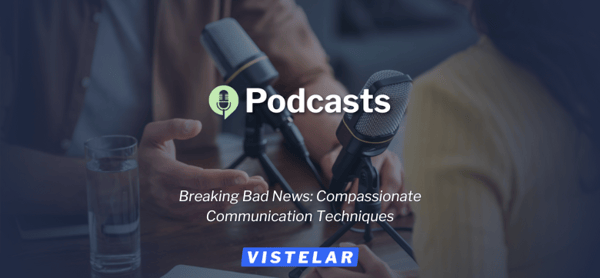When healthcare organizations invest in workplace violence prevention training, they often use the term “de-escalation” as an umbrella term for the approach to both prevention and intervention. However, understanding the difference between a preventative approach, “non-escalation”, and an intervention approach, “de-escalation”, is crucial for building truly effective conflict management programs....
Blog Posts of Vistelar Team
Vistelar is a licensing, training, and consulting institute focused on helping organizations improve safety through a systematic approach to workplace conflict management. Our Unified Conflict Management System™ uses easy-to-learn and trauma-responsive tactics — based on over four decades of real-world experience and frequent enhancements — to empower teams to identify, prevent, and mitigate all types of conflict, from simple disputes to physical violence.
Key Takeaways from Vistelar’s October Webinar
In this October webinar, Dave Young discussed how Patient Care Safety Monitors play a critical role in suicide prevention. The session focused on how these team members help identify early warning signs, maintain patient dignity during high-risk situations, and support clinical teams through consistent presence and effective communication. Presenters also shared practical strategies and...
Good Speak: Non-Escalation Strategies for Healthcare—Podcast
“Good Speak: Non-Escalation Strategies for Healthcare” — Episode 35
Co-host: Marcus—former healthcare security director
Co-host: Natalie—nurse practitioner and clinical team leader
Subscribe to our podcast on Apple Podcasts or Spotify
Beyond Words: Mastering Non-Verbal Communication in Medical Settings
In healthcare environments, what you don't say can be just as powerful as what you do say. Research shows that approximately 93% of communication is affected by body language and non-verbal cues, making your silent signals a critical component of patient care. For healthcare professionals, mastering non-verbal communication isn't just about improving patient satisfaction—it's about creating...
Red Flags: Spotting Antecedents to Prevent Workplace Violence
The stark reality facing healthcare leaders today is undeniable: 81.6% of nurses report having experienced at least one type of workplace violence in the past year, with 45.5% reporting an increase in incidents in their units. This is especially alarming when you consider that less than a third of healthcare facilities have clear workplace violence incident reporting mechanisms in place. Perhaps...
The Universal Greeting: A Key to Better Patient Interactions
The moment a patient first encounters you may determine not only their experience, but the trajectory of their entire care journey. Here's how the Universal Greeting can revolutionize your approach to patient interactions while building the foundation for successful Non-Escalation.
Preventing Medical Errors Through Effective Communication Strategies
Healthcare organizations face a sobering reality: communication failures are among the leading causes of preventable medical errors, contributing to patient harm, increased costs, and damaged reputations. With over 400,000 hospitalized patients experiencing preventable harm annually and healthcare costs of medical errors ranging from $20-45 billion per year, the urgency for systematic...
Breaking Bad News: Compassionate Communication Techniques—Podcast
“Breaking Bad News: Compassionate Communication Techniques” — Episode 34
Co-host: Marcus—former healthcare security director
Co-host: Natalie—nurse practitioner and clinical team leader
Subscribe to our podcast on Apple Podcasts or Spotify
Trauma-Informed Care: Approaching Sensitive Patient Interactions
In healthcare settings, every interaction carries the potential to either heal or harm. Even a routine medical encounter can quickly transform from a healing opportunity into a re-traumatizing experience. As healthcare professionals, understanding trauma-informed communication isn't just beneficial—it's essential for providing compassionate, effective care that honors the dignity of every...
Verbal De-escalation: Essential Skills for Healthcare Professionals
Healthcare environments are high-pressure settings where emotions can run high and tensions can escalate quickly. With 76% of emergency room nurses reporting experiences with workplace violence and The Joint Commission noting a consistent increase in violence-related incidents over the past five years, the ability to prevent escalation when able and de-escalate situations verbally when necessary...











